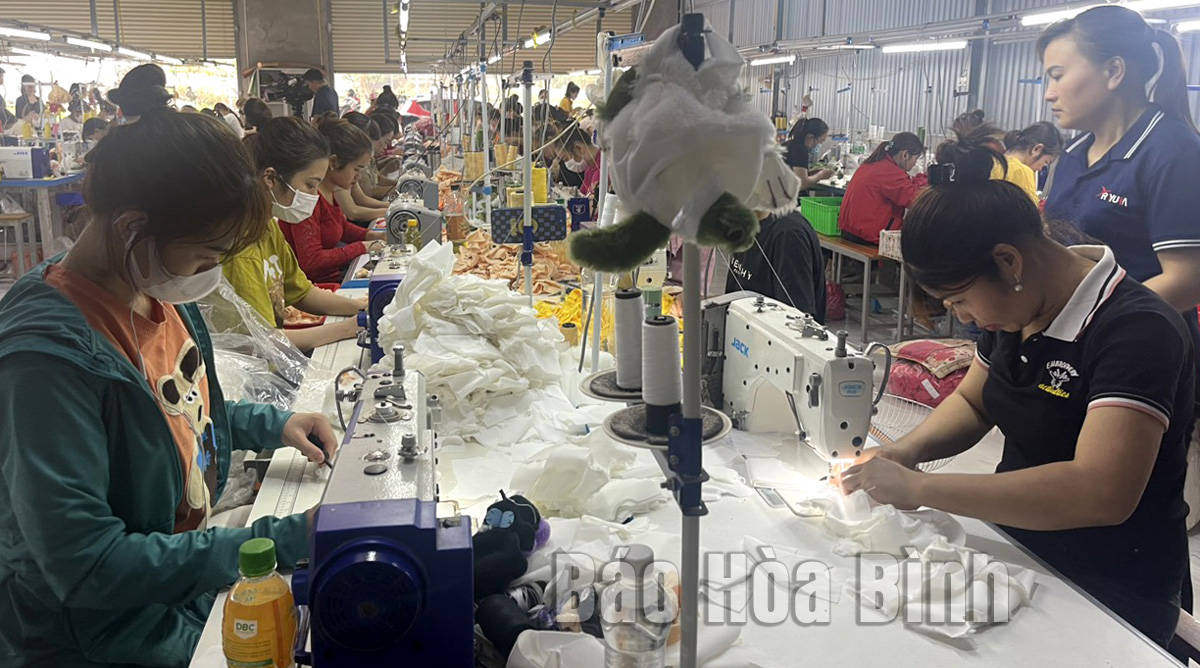



In order to improve the quality of vocational training for the laborerd, the Center for Vocational Education and Continuing Training in Lac Son district has cooperated with Long Vien Co., Ltd. to provide vocational training and create jobs for the rural laborers.
Living in a particularly difficult area, Ms. Quach Thi Tam from Khu hamlet, Tuan Dao commune has always been struggling to find a stable job to earn more monthly income for many years. In 2021, the National Target Program for Socio-Economic Development in the areas of etnic minorities and mountainous areas was implemented in the district and opened a sewing class for the laborers, and Ms. Tam registered to attend. After 2 weeks of learning the basic sewing theory and practice on the industrial sewing machine, Ms. Tam was directly sent to Long Vien Co., Ltd. in Xuat Hoa commune, whcih specializes in the production of stuffed animals for vocational training. After a month of studying in the form of hands-on work, Ms. Tam was assigned to the sewing line and received a salary according to the product. "Having been supported with the tuition fee, the expense for lunch, petrol, and received an apprenticeship salary and got a job right after completing my studies, I feel really lucky to join this vocational class. Thanks to that, I have a job and have an extra income” - Ms. Tam shares.
In the same course as Ms. Quach Thi Tam, there were 40 students from the poor households and mountainous ethnic minorities who were also accepted by Long Vien Co., Ltd. to work with an average salary of 3.5 - 4 million VND a person. A month. Long Vien Co., Ltd currently has 3 sewing locations, mainly located in the remote and far-away communes. For many years, the company has coordinated with the Center for Vocational Education & Continuing Training in Lac Son district to organize sewing classes and recruit workers after graduating from the vocational training. Ms. Bui Thi Thanh, the manager of Long Vien company says: The cooperation with the District’s Center for Vocational Education & Continuing Training can be said to be mutually benificial. For the company, we are beneficial in fact that the center has helped to screen and select the employees who have the need for vocational training and those are conscious and want to find a job. After that, the center teaches the theory, instructs the leaners the basic seams, when they enter the company, we just need to give some more instruction, and they can very quickly sew products.
Vocational training associated with job creation basing on the needs of businesses and workers is a way to open up many opportunities to escape poverty the laborers in the areas of ethnic minorities and mountainous areas in Lac Son district. In 2022, from the funding of the programs for the Sustainable Poverty Reduction and the Socio-Economic Development in the areas of ethnic minorities and mountainous areas, the district organized 13 vocational training classes for the rural laborers and the young people in the the areas of ethnic minorities with a total of 354 participants. In which, there were 10 classes in the non-agricultural occupation group, including sewing, agricultural machine repair, civil electricity, cooking techniques and 3 agricultural classes, including chicken raising, plant protection... With the local budget, the district opened 6 vocational training classes with a total of 170 employees in the area. In the first quarter of 2023, the district has implemented 6 vocational training classes for 170 laborers who are from the poor households and young people in the areas of ethnic minorities.
As one of the first areas of the district to benefit from a vocational training program from the capital for the socio-economic development of the areas of ethnic minorities and mountainous areas in 2023, Vu Ban town organized a technical class on raising chickens for more than 30 leaners. Ms. Bui Thi Huyen from Chieng Trao village, a trainee in the vocational training class says: Taking advantage of the large garden land, my family has built a model of raising free-range chickens. This is also a new model that my family starts building. Therefore, when I attended a training class on raising chickens for 3 months, my husband and I considered it as if we were both learning and practicing and applying it on our family's chickens. After studying, I found the knowledge really useful. Previously, I thought that raising chickens in the close-wind cycle could help to avoid diseases when the weather changed. Now, I have known that building and organizing more scientific barns can ensure the dryness so taht the chickens can grow up quickly, and at the same time it helps keep the environment clean.
With the effective implementation of the program for vocational training and job creation for the areas of ethnic minorities and mountainous areas, Lac Son district has gradually exploited the potentials and advantages of the locality, promoting economic development, ensuring the social security and the sustainable poverty reduction. Up to now, the rate of trained workers in the district has reached over 51%, the per capita income is 45.3 million VND a year, the poverty rate in the whole district is 24.13%. The face of the rural mountainous areas, especially the difficult areas has gradually changed.